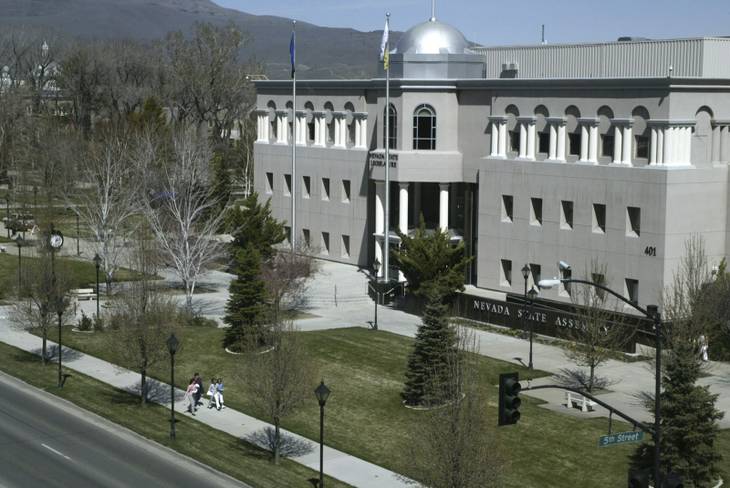Slot parlors, the role of technology in gambling and illegal sports betting are among the casino-related issues that the Nevada Legislature could take up when it convenes in three months.
Draft requests for several gaming bills are posted on the Legislature’s website, and while it’s still too early to predict what will actually become law, elected officials are beginning to talk about possibilities. It was a big focus at a legislative panel during last week’s gaming law conference in Las Vegas.
Gaming is an interest that transcends party lines, so the new Republican control over Carson City isn’t likely to change the agenda much, legislators said during the panel. That doesn’t mean every elected official is on the same page about what’s best for the gaming industry, but where differences arise, they may not be strictly partisan ones.
That said, here’s an overview of some gaming issues that could come up in Carson City next year:
Slot parlors: Sen. Tick Segerblom, D-Las Vegas, wants to tackle the regulation of so-called slot parlors like Dotty’s, which has been a particularly thorny topic in Clark County. Segerblom’s thinking, like that of many Dotty’s critics, is that they earn too much revenue from slot machines even though gaming is supposed to be “incidental” to their overall business under state law. That means Dotty’s gets away without paying its “fair share” in taxes, Segerblom said.
One of Segerblom’s ideas is to create a new gaming license category specifically for slot parlors. Currently, gambling regulators award two types of licenses: nonrestricted (for traditional casinos) and restricted (think taverns like PT’s with bartop gaming machines). Critics contend that chains like Dotty’s operate more like mini-casinos than bars by emphasizing gaming over the sale of food and drinks.
The slot parlor license, Segerblom said, would require a business to pay more in taxes than what a restricted license mandates.
Segerblom also wants to see language added to state law specifying that the gambling industry is meant for the betterment of the state. He’s hoping that rhetoric would bolster his argument for higher taxes on slot parlors by reinforcing the idea that gambling is supposed to provide the state with revenue.
“I’m not sure it would make a big difference, but one of the fights is the Dotty’s issue,” he said. “From my perspective, they really don’t pay their fair way.”
Clark County is already considering tightening its own regulations to crack down on slot parlors. A county ordinance introduced last month would require bars with slot machines to get at least half their revenue from food and drink sales.
Technology: The last legislative session created a committee to study a host of issues related to the intersection of technology and gambling. That committee recommended this year that the state government allow the Nevada Gaming Commission “to promulgate regulations that encourage development and deployment of gaming devices incorporating innovative, alternative, and advanced technologies.”
“There’s going to be new technologies and new ideas that pop up, and any hindrances to allowing those to the floor, I think the committee was saying, should be removed to the extent allowable,” said Gaming Control Board Chairman A.G. Burnett, a nonvoting member of the committee. “But we need to continue strict gaming regulation and uphold our standards.”
The control board has also requested a bill to simplify some gaming technology regulations. Burnett said it’s a way for regulators to “continue to get our arms around some of the new things that are coming to the gaming floor.”
Illegal sports betting: Another bill requested by the control board would make unauthorized sports wagering illegal. Burnett said it’s a problem across the country, particularly with the advent of Internet gaming, and current state law doesn’t address it head on.
“Right now, the statutes aren’t necessarily clear, and we want to make the crime of illegal bookmaking more specific,” Burnett said. “We’re creating more specific crimes so that prosecutors have more of an ability to go after illegal bookmaking activities.”
Live entertainment tax: Sen. Greg Brower, R-Reno, suggested at the gaming law conference that the Legislature needs to reform Nevada’s live entertainment tax. The tax was passed about a decade ago and is imposed when businesses offer certain types of entertainment. Many casinos pay the tax, and Brower said the requirements surrounding it aren’t very clear.
“There seems to be a consensus that we need to clean that up,” said Brower, who’s set to chair the Senate Judiciary Committee. “It stems largely from the confusion surrounding what is live entertainment under the statute.”
Election betting: Segerblom plans to keep pushing his proposal that Nevada allow wagering on federal elections. The idea is that the state should allow such wagers since individuals can already place bets overseas, and it would bring in more revenue for the state. But Gov. Brian Sandoval indicated earlier this year that he’s not convinced it’s a good idea.
“I’m an optimist,” Segerblom said of the odds that his proposal will come to fruition. “The reality is, it’s a great idea, the election’s coming up and there’s a lot of interest.”
